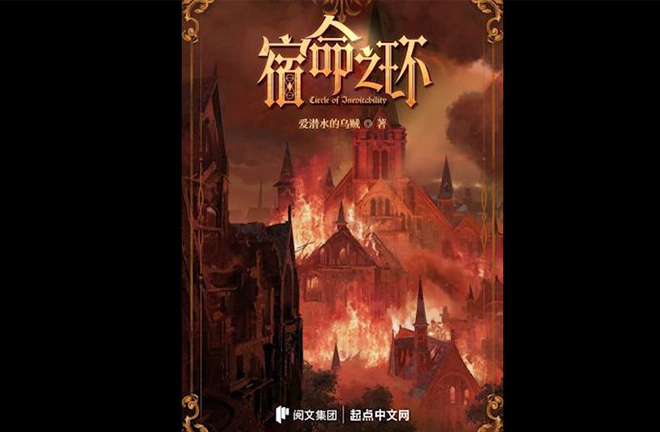CASS report presents dynamics on online literature in 2023

FILEPHOTO: The cover of the popular online literary work “Circle of Inevitability”
On Feb. 26, the Institute of Literature at the Chinese Academy of Social Sciences held a press conference in Beijing to release a report on the development of online literature in China in 2023.
In his keynote speech at the conference, Gao Xiang, president of CASS and secretary of the leading Party members’ group at CASS, highlighted the robust development of online literature in China since the inception of the new era. He attributed this progress to the guidance of Xi Jinping Thought on Culture, as well as the concerted efforts of multiple parties and self-discipline in the field.
As the literary creation ecosystem and order within it continue to improve, many literary, thoughtful, realistic, and readable pieces have emerged. Online literature has increasingly approached the mainstream stage, with its social clout expanding, Gao continued.
In 2023, Chinese online literature notably integrated elements of fine traditional Chinese culture into various subject matters and genres, telling Chinese stories with many distinct, lively, artistic characters, Gao said. Inheriting and developing fine traditional Chinese culture, these works have played an increasingly significant role in demonstrating the originality and popularity of Chinese wisdom, and displaying a trustworthy, endearing, and respectable image of China.
As a new literary form born out of Chinese modernization, online literature offers new expressions of the modern Chinese civilization and new channels through which the world can understand China, said Hu Bangsheng, a member of the leading Party members’ group at the China Writers’ Association. Representing a new vehicle for building China’s cultural strength and the most vigorous force of literature in the internet era, online literature has become an important component of contemporary Chinese socialist literature.
Zhang Hong, a former member of the leading Party members’ group at the China Federation of Literary and Art Circles, stressed that in recent years, online literature has gradually transitioned from marginalized to mainstream, from a local to a global presence, and from highlighting the spirit of individual independence to exhibiting human thought and emotional experience. It has showcased a complicated, diversified cultural landscape and development tendency.
Liu Hanjun, director of the bureau of literature and arts under the Publicity Department of the CPC Central Committee, remarked that online literature makes the people protagonists under writers’ pen, creators of works, and subjects enjoying cultural interests. This reflects the people-centered, “people-first” principles emphasized by General Secretary of the CPC Central Committee Xi Jinping.
The report unveiled at the conference analyzed and evaluated online literary creations in 2023 across various dimensions, including writers and works, the development of intellectual property, overseas dissemination, and copyright protection initiatives.
According to the report, the Chinese online literature industry continued to grow in 2023, under the guidance of the spirit of the 20th CPC National Congress and Xi Jinping Thought on Culture. Spurred by the three core trends of increasing high-quality works, accelerating intellectual property transformation, and deepening globalization, Chinese online literature continuously extended its reach as a lively practice of mass participation and global co-creation, and a manifestation of Chinese culture’s originality. It served as a cultural card for telling Chinese stories well and delivering Chinese voices.
Data shows that by the end of 2023, the market value of Chinese online literature had reached 40.43 billion yuan (approximately $5.62 billion), up 3.8% year-on-year, while the market value of intellectual property in Chinese online literature jumped to 260.5 billion yuan, an increase of nearly 10 billion yuan from 2022.
Moreover, the number of writers, published works, and readers grew steadily. The number of writers exceeded 24 million, with an addition of 2.25 million new writers compared to 2022. The total number of works rose to 36.2 million, an increase of 4.2 million over the previous year. Additionally, the number of users saw an increase of 9% year-on-year, reaching 537 million.
Edited by CHEN MIRONG
